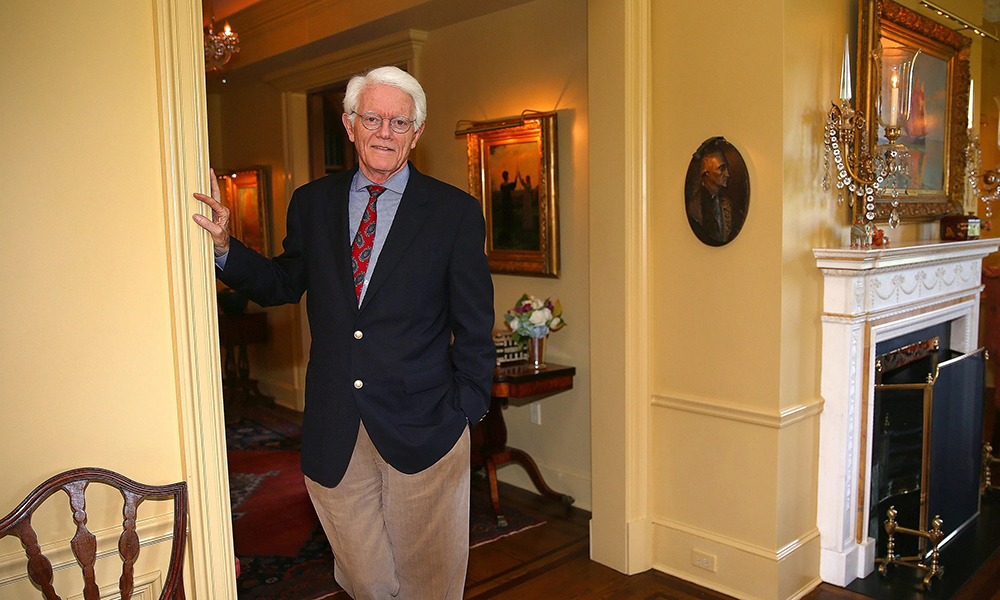
從1977年到1990年46歲的時候突然退休,林奇將富達投資集團(Fidelity Investments)旗下的麥哲倫基金(Magellan Fund)從一只規模只有2,000萬美元的小基金,發展成資產規模高達140億美元的行業巨頭,他也在這個過程中成為華爾街的傳奇。
在1989年《財富》雜志一篇名為《冠軍投資者的秘訣》(Secrets of a Champion Investor)的文章里,《巴倫周刊》(Barron’s)的現任特約編輯、當時還年輕的蘇安迪(Andrew Serwer)在一次長時間采訪中,討論了林奇的投資理念。這篇文章給散戶投資者的建議很簡單:尋找“股價較低”但業務蒸蒸日上的公司,并且在投資前要進行分析研究,充分了解該公司的業務。
林奇表示,在投資之前,他會在現實世界中尋找優秀的公司,比如對塔可貝爾(Taco Bell)的一種玉米餅進行抽樣調查,或者發現妻子更喜歡Hanes品牌的連褲襪;然后分析這些公司的發展潛力、商業模式、資產負債表、估值,甚至對公司進行調研、親自到公司考察,以及電話聯系公司員工。林奇后來在2000年出版的《彼得·林奇的成功投資》(One Up on Wall Street)一書里詳細介紹了這種“買你了解的股票”的投資風格。這種策略讓這位基金經理數十年來的業績始終領先于同行,并讓他收獲了大批散戶粉絲。人們希望從他這里獲得退休期間謹慎投資的建議。
但即便是最優秀的投資者也會犯錯。對林奇而言,最大的錯誤是錯失了一些投資機會。在4月25日接受美國消費者新聞與商業頻道(CNBC)采訪時,林奇談到自己錯過了蘋果(Apple)和芯片制造商英偉達(Nvidia)的崛起,雖然他很早就從現實世界中看到了這些公司成功的跡象,就像他在數十年前從塔可貝爾和Hanes身上看到的那樣。
林奇哀嘆道:“蘋果的業務不難理解。我的意思是,我是有多愚蠢?”林奇現任富達管理研究有限公司(Fidelity Management & Research)的副董事長。他表示,早在2000年代初,他就注意到女兒買了一部iPod,他發現蘋果有很高的銷售利潤,但他沒有購買蘋果的股票。“我應該對蘋果做一些功課……它并不是一家復雜的公司。”
雖然錯過了一些機會,林奇并不認為應該因為擔心錯過機會而跟風投資熱門股票,尤其是在沒有充分了解公司業務的情況下。他警告散戶:“你必須慎重,仔細研究資產負債表。公司股票上漲的原因是什么?‘買入股票的人越來越多’并不是合理的理由。”
林奇指出,為了獲得豐厚的長期收益,投資者應該尋找“一家業務好轉或有增長潛力的公司”,然后分析公司的資產負債表,以確定其是否管理得當,并且沒有背負太多債務。雖然一些華爾街的分析師警告投資者,由于美國可能陷入經濟衰退,應該繼續采取防御性的投資策略,但林奇認為“沒有人能預測未來”,關鍵是要在投資前充分評價每一家公司。
他說:“要知道,自第二次世界大戰(World War II)以來,我們經歷了13次衰退和13次復蘇。我無法預測未來,但有許多人預期或者預測會發生經濟衰退,或許這確實會發生,但我不能確定。”(財富中文網)
翻譯:劉進龍
審校:汪皓
從1977年到1990年46歲的時候突然退休,林奇將富達投資集團(Fidelity Investments)旗下的麥哲倫基金(Magellan Fund)從一只規模只有2,000萬美元的小基金,發展成資產規模高達140億美元的行業巨頭,他也在這個過程中成為華爾街的傳奇。
在1989年《財富》雜志一篇名為《冠軍投資者的秘訣》(Secrets of a Champion Investor)的文章里,《巴倫周刊》(Barron’s)的現任特約編輯、當時還年輕的蘇安迪(Andrew Serwer)在一次長時間采訪中,討論了林奇的投資理念。這篇文章給散戶投資者的建議很簡單:尋找“股價較低”但業務蒸蒸日上的公司,并且在投資前要進行分析研究,充分了解該公司的業務。
林奇表示,在投資之前,他會在現實世界中尋找優秀的公司,比如對塔可貝爾(Taco Bell)的一種玉米餅進行抽樣調查,或者發現妻子更喜歡Hanes品牌的連褲襪;然后分析這些公司的發展潛力、商業模式、資產負債表、估值,甚至對公司進行調研、親自到公司考察,以及電話聯系公司員工。林奇后來在2000年出版的《彼得·林奇的成功投資》(One Up on Wall Street)一書里詳細介紹了這種“買你了解的股票”的投資風格。這種策略讓這位基金經理數十年來的業績始終領先于同行,并讓他收獲了大批散戶粉絲。人們希望從他這里獲得退休期間謹慎投資的建議。
但即便是最優秀的投資者也會犯錯。對林奇而言,最大的錯誤是錯失了一些投資機會。在4月25日接受美國消費者新聞與商業頻道(CNBC)采訪時,林奇談到自己錯過了蘋果(Apple)和芯片制造商英偉達(Nvidia)的崛起,雖然他很早就從現實世界中看到了這些公司成功的跡象,就像他在數十年前從塔可貝爾和Hanes身上看到的那樣。
林奇哀嘆道:“蘋果的業務不難理解。我的意思是,我是有多愚蠢?”林奇現任富達管理研究有限公司(Fidelity Management & Research)的副董事長。他表示,早在2000年代初,他就注意到女兒買了一部iPod,他發現蘋果有很高的銷售利潤,但他沒有購買蘋果的股票。“我應該對蘋果做一些功課……它并不是一家復雜的公司。”
雖然錯過了一些機會,林奇并不認為應該因為擔心錯過機會而跟風投資熱門股票,尤其是在沒有充分了解公司業務的情況下。他警告散戶:“你必須慎重,仔細研究資產負債表。公司股票上漲的原因是什么?‘買入股票的人越來越多’并不是合理的理由。”
林奇指出,為了獲得豐厚的長期收益,投資者應該尋找“一家業務好轉或有增長潛力的公司”,然后分析公司的資產負債表,以確定其是否管理得當,并且沒有背負太多債務。雖然一些華爾街的分析師警告投資者,由于美國可能陷入經濟衰退,應該繼續采取防御性的投資策略,但林奇認為“沒有人能預測未來”,關鍵是要在投資前充分評價每一家公司。
他說:“要知道,自第二次世界大戰(World War II)以來,我們經歷了13次衰退和13次復蘇。我無法預測未來,但有許多人預期或者預測會發生經濟衰退,或許這確實會發生,但我不能確定。”(財富中文網)
翻譯:劉進龍
審校:汪皓
Between 1977 and 1990, when he suddenly retired at age 46, Peter Lynch grew Fidelity Investments’s Magellan fund from a $20 million pipsqueak into a $14 billion giant and became a Wall Street legend in the process.
In a 1989 Fortune article titled “Secrets of a Champion Investor,” a young Andrew Serwer, now editor-at-large of Barron’s, spoke to Lynch about his investing philosophy in a lengthy interview. The takeaway for retail investors was rather simple: Look for thriving businesses at “cut-rate prices,” and do your homework to understand the firms’ operations fully before investing.
Lynch described how he would spot quality companies in the real world, by sampling a Taco Bell burrito or noticing that his wife preferred Hanes brand panty hose; then analyzing their growth prospects, business model, balance sheet, valuation, and even “kicking the tires” at the firm—making in-person visits and calls to employees—before making an investment. This “buy what you know” style, which Lynch later detailed in his 2000 book called One Up on Wall Street, helped the money manager outperform his peers for decades, and has garnered him an audience among retail investors seeking prudent advice during retirement.
But even the best investors make mistakes, and for Lynch, his most glaring errors are the opportunities that got away. In a April 25 CNBC interview, he described missing out on the rise of Apple and the chipmaker Nvidia, despite seeing signs of the success of their businesses in the real world years ago, just as he once had with Taco Bell and Hanes decades before.
“Apple was not that hard to understand. I mean, how dumb was I?” Lynch, who now serves as vice chairman of Fidelity Management & Research, lamented, describing how he noticed his daughter buying an iPod in the early 2000s and found out Apple was making a significant profit on the sale, but he didn’t buy any stock. “I should have done some work on Apple…it’s not a complicated company.”
Still, despite the missed opportunities, Lynch doesn’t believe in chasing trendy stocks for fear of missing out, especially if he doesn’t fully understand the business. “You really have to be careful, look at the balance sheet,” he warned retail investors. “What is the reason the stock is going higher? ‘The sucker is going up’ is not a good reason.”
In order to make serious long-term gains, Lynch said investors should be looking for “a company that’s either a turnaround [story] or that’s going to grow” and then analyze its balance sheet to ensure its properly managed and doesn’t have too much debt. And while some on Wall Street have cautioned investors to remain defensive due to the potential for a U.S. recession, Lynch said “no one can predict the future” and what matters is properly evaluating each individual business before investing.
“You know, we’ve had 13 recessions since World War II and 13 recoveries,” he said. “I cannot predict the future, but this recession is so expected, so predicted, maybe it’s coming, but I don’t know.”






